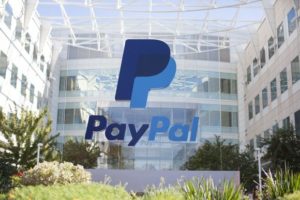In an unexpected move, China will allow foreign companies access to its electronic payments market. China’s central bank said companies can apply for a payments license in the most populous country, and any information collected from customers must be stored within the country’s borders. There are additional requirements, including setting up a local business in China, and establishing data-backup systems and payment service facilities.
This move could open the door for a greater opportunity for digital payments company PayPal Holdings, Inc. (NASDAQ: PYPL), giving it a chance to compete in China’s fast-growing mobile payments space. With that opportunity, though, come significant challenges.

Local partners
PayPal already has its foot in the door to the Middle Kingdom. Last year, the company entered into a partnership with Chinese search leader Baidu, Inc. (NASDAQ: BIDU). This strategic alliance allowed 100 million Baidu Wallet users to link their accounts to PayPal, letting them pay for goods purchased outside China, giving them access to the 17 million merchants that accept PayPal. The move was expected to provide international vendors a way to gain access to millions of Chinese consumers.
In 2016, the company forged an agreement with Alibaba (NYSE: BABA), making PayPal a payment option on the e-commerce provider’s global retail marketplace. This partnership was designed to drive “cross-border traffic, as PayPal consumers outside of China shop on AliExpress merchants in China,” according to PayPal CEO Dan Schulman.
Growing popularity
If PayPal wants to compete beyond the Great Wall, the company will have to bring it’s A-game and be prepared to compete with deeply entrenched local favorites.
Mobile payments have enjoyed significant adoption in China, and the two incumbents control the majority of the industry. Alibaba’s AliPay and Tencent’s (NASDAQOTH: TCEHY) WeChat app controlled over 90% of China’s mobile wallet market. In 2016, the last full year for which complete figures are available, AliPay generated $1.7 trillion in digital payment volume, while WeChat produced $1.2 trillion — adding up to nearly $3 trillion combined.
For the first 10 months of 2017, mobile payments in China jumped to $16.7 trillion, up 37.8% year over year. With WeChat experiencing more rapid growth than AliPay, it’s entirely possible that it may have taken the top spot when the final numbers are calculated for 2017.

Tough competition
While PayPal may be a household name in the U.S. it faces an uphill battle with Chinese consumers, as its competitors have the home field advantage. Each company has specific strengths when it comes to digital payments.
Alibaba’s e-commerce platform provides marketing, sales, and deliveries, so payments was a natural fit to the company’s existing operations. The company controls the country’s two most widely used e-commerce platforms, Tmall and Taobao, which together process more than 70% of all e-commerce transactions in China.
WeChat is the most widely used social media platform in China, but that doesn’t do the app justice. There isn’t an equivalent product in the U.S., as it offers messaging, payments, games, and the ability to schedule ride-sharing and food deliveries — along with its social component. Its parent, Tencent, is also the largest video-game publisher in the world.
Digital payments have seen far greater adoption in the Middle Kingdom than they have in the U.S. The combination of significant smartphone penetration, limited credit-card use, and its centralized e-commerce market have enabled a more rapid expansion of mobile payments in China.
It’s all in the approach
There’s no doubt PayPal has made all of the right moves in expanding its services to every other corner of the globe, but China will be a tough nut to crack. The company faces two closed ecosystems that are deeply entrenched among Chinese consumers, and it’s always difficult to dislodge the sitting incumbent.
PayPal has done its best to get its name out there, and the ability to do things the local favorites can’t do may give the company an edge. It’s also interesting to note that at an investor conference last year, PayPal CEO Dan Schulman said that digital payment providers in China were “an aspiration for us” and commended their “suite of very complementary services that enable the consumers to open that app every single day.” This shows that the company is willing to learn from the leaders.
I wouldn’t rule PayPal out, but it’s going to be tough for the company to scale the Great Wall.


